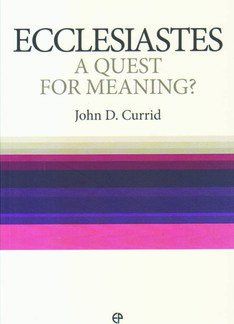It is commonly acknowledged that Ecclesiastes is one of the most difficult biblical books to understand. Many believers puzzle over its meaning, as they grapple with the author’s seemingly bleak view of life, where ‘all is vanity and grasping for the wind’. However, this commentary, unfolding the message of Ecclesiastes in a straightforward way with valuable lessons, is most welcome.
The commentator argues that Solomon is the author of Ecclesiastes. He rightly notes that defining the recurring word ‘vanity’ (Hebrew, hebel) is key to understanding the book. Despite the NIV’s rendering, it does not mean ‘meaningless’, but ‘fleeting’, like a puff of wind. Ecclesiastes’ ‘preacher’ brings us face-to-face with the brevity and uncertainty of ‘life under the sun’.
Some regard the book as a kind of pre-evangelistic tract that shows us the emptiness of life apart from God. That is certainly one of the preacher’s main themes but, as Currid shows, that is not all there is to his message. Ecclesiastes encourages those who believe in God to enjoy life as a gift from him. Knowing this helps us to treasure this fleeting life and rejoice in God’s good gifts of work, family life, food and drink.
The preacher certainly does not view life through rose-tinted spectacles. In this fallen world we witness suffering, injustice and the loss of loved ones. But we are assured in chapter 3:1-8 that all events are subject to God’s sovereign control. Currid sees the material in chapters 4-7 as a series of responses to objections to God’s sovereignty, but that may be to force the material into too rigid a grid — for example, in chapter 5.
Ecclesiastes isn’t simply about trying to make sense of ‘life under the sun’ with all its perplexing challenges. As Currid brings out, it is a deeply practical book. Wise counsel is offered concerning our attitude to fame and fortune, youth and old age, and how we should relate to those in power. The book helps to foster a godly attitude to life, as summed up in the words of its conclusion: ‘Fear God and keep his commandments, for this is the whole duty of man’ (Ecclesiastes 12:13).
The author writes with simplicity and hints at how the lessons of Ecclesiastes may be applied to our everyday lives. He relates the teaching of the book to the fuller revelation of the New Testament and shows how the preacher points to Christ. Overall, this is a useful addition to the Welwyn Commentary Series.
Guy Davies
Westbury





